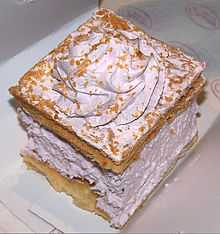Kremówka
| Kremówka | |
|---|---|
| cream pie | |
 Two typical kremówkas | |
| Alternative name(s): | |
| Napoleonka | |
| Place of origin: | |
| Poland | |
| Main ingredient(s): | |
| puff pastry filled with cream | |
| Recipes at Wikibooks: | |
|
| |
| Media at Wikimedia Commons: | |
|
|


Kremówka, napoleonka (Slovak: Krémeš, German: Cremeschnitte) is a Polish type of cream pie. It is made of two layers of puff pastry, filled with whipped cream, creamy buttercream, vanilla pastry cream (custard cream) or sometimes egg white cream, and is usually sprinkled with powdered sugar.[1] It also can be decorated with cream or covered with a layer of icing.
In some places in Poland the cake is known as kremówka (roughly translated as "cream cake"), in others, it is called napoleonka.[2] This Polish "war" between names kremówka and napoleonka has been subject to a satirical drawing by Polish illustrator Andrzej Mleczko.[2]
The cake itself is a variation of mille-feuille[3][4] - a French dessert made of three layers of puff pastry filled with cream or jam - also known as the Napoleon.
Sometimes kremówkas containing alcohol are sold, those became popular particularly in the aftermath of a false story that Pope John Paul II was fond of that variant.[5][6] In fact, the Pope was fond of the traditional kremówka.[7][6]
Papal kremówka
On 16 June 1999 pope John Paul II mentioned that after he had completed his matura exam, he had kremówkas with his colleagues in his home town of Wadowice. They wagered who could eat more. The future Pope ate eighteen kremówkas but did not win the bet.[6]
And there was a cake shop. After the matura we went for kremówkas. That we survived that all, those kremówkas after the matura....—Pope John Paul II[8]
This was publicized by media, and "papal" kremówkas from Wadowice became popular in Poland.[5][7][6]
The confectionery shop where the Pope ate kremówkas was owned by Jewish cake maker Karol Hagenhuber, who came to Poland from Vienna.[6] It was located in Wadowice Town Square.[6] Some speculated that the original papal kremówkas contained alcohol, but this was denied by Hagenhuber's son.[6] According to him his father's cakes were regular, non-alcoholic kremówkas, although made with all natural ingredients, using a traditional recipe.[6] Either way this led to renewed, and even international fame for the cake, rebranded as "papal".[5][7][6]
In 2007, to celebrate Pope John Paul's II 87th birthday, a giant kremówka was baked in Rzeszów.[9]
"Papal kremówkas" are filled with pastry (custard) cream.[5][7]
References
| Wikimedia Commons has media related to Kremówka. |
- ↑ Flis, Krystyna; Procner, Aleksandra. "Wyroby z ciasta francuskiego". Technologia gastronomiczna z towaroznawstwem: podręcznik dla technikum. Część 2 (in Polish) (Wydanie XVIII, 2009 ed.). Wydawnictwa Szkolne i Pedagogiczne SA. p. 179. ISBN 978-83-02-02862-5.
- ↑ 2.0 2.1 (Polish) Smolorz, Michał (2010-08-23). "Odwieczna wojna napoleonki z kremówką". Gazeta Wyborcza. Retrieved 28 March 2012.
- ↑ Jabłońska, Anna; Matyaszczyk, Dorota. "„Napoleon i jego epoka w Wielkopolsce” XIV Europejskie Dni Dziedzictwa Kulturowego w Wielkopolsce 2006". Wielkopolskie Towarzystwo Genealogiczne "Gniazdo". Retrieved 28 March 2012.(Polish)
- ↑ (Polish) Robert Makłowicz, Piotr Bikont, Deser królowej Karoliny, Wprost, 1/2005 (1153). Retrieved 15 June 2011
- ↑ 5.0 5.1 5.2 5.3 Poland: Kremowka Papieska / "Papal" Cream Cake, European Cuisine. Retrieved 28 March 2012
- ↑ 6.0 6.1 6.2 6.3 6.4 6.5 6.6 6.7 6.8 (Polish) Małgorzata Skowrońska, Plebiscyt kulinarny. Kariera pijanej kremówki , Gazeta Wyborcza, 07.08.2010. Retrieved 15 June 2011
- ↑ 7.0 7.1 7.2 7.3 Polish Papal Cream Cake Recipe - Kremowka Papieska. About.com. Retrieved 28 March 2012
- ↑ Jan Paweł II, Polska 1999. Przemówienia i homilie, Warszawa: Katolicka Agencja Informacyjna; Marki: "Michalineum", 1999, ISBN 83-7019-226-2, p. 247.
- ↑ (Polish) Kremówka-gigant na urodziny Jana Pawła II. Kosciol.pl. 12 March 2007. Retrieved 15 June 2011